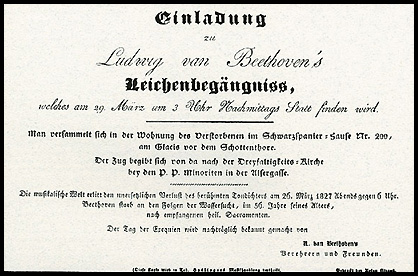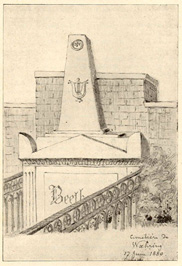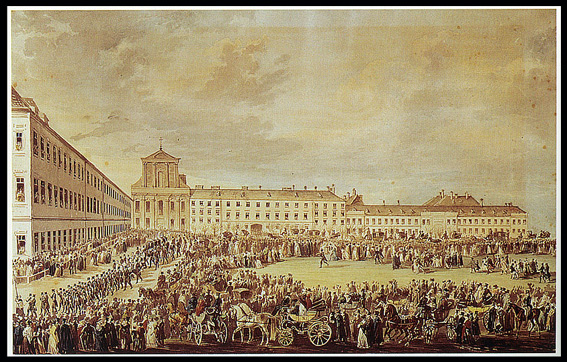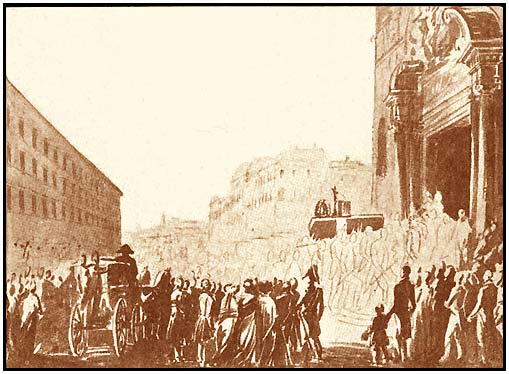| |
|
 |
|
On the afternoon of Thursday, March 29th 1827, between 10,000 and 30,000 people united for the funeral of Ludwig van Beethoven. The actor Heinrich Anschütz, read the funeral oration written by Franz Grillparzer, (a great writer), in front of the doors of the Währing Cemetery (now Schubert Park). |
 Invitation to Beethoven's funeral... |
|
|
| |
|
We who stand here at the grave of the deceased are in a sense the representatives of an entire nation, the whole German people, come to mourn the passing of one celebrated half of that which remained to us from the vanished brilliance of the fatherland. The hero of poetry in the German language and tongue still lives -- and long may he live. But the last master of resounding song, the gracious mouth by which music spoke, the man who inherited and increased the immortal fame of Handel and Bach, of Haydn and Mozart, has ceased to be; and we stand weeping over the broken strings of an instrument now stilled. |
 Beethoven's first tomb Drawing by Vincent d'Indy - 1880... |
|
An instrument now stilled. Let me call him that! For he was an artist, and what he was, he was only through art. The thorns of life had wounded him deeply, and as the shipwrecked man clutches the saving shore, he flew to your arms, oh wondrous sister of the good and true, comforter in affliction, the art that comes from on high! He held fast to you, and even when the gate through which you had entered was shut, you spoke through a deafened ear to him who could no longer discern you; and he carried your image in his heart, and when he died it still lay on his breast. He was an artist, and who shall stand beside him? As the behemoth sweeps through the seas, he swept across the boundaries of his art. From the cooing of the dove to the thunder's roll, from the subtlest interweaving of willful artifices to that awesome point at which the fabric presses over into the lawlessness of clashing natural forces -- he traversed all, he comprehended everything. He who follows him cannot continue; he must begin anew, for his predecessor ended where art ends. Adelaide and Leonore! Commemorations of the heroes of Vittoria and humble tones of the Mass! Offspring of three and four-part voices. Resounding symphony, "Freude, schöner Götterfunken", the swansong. Muses of song and of strings, gather at his grave and strew it with laurel! He was an artist, but also a man, a man in every sense, in the highest sense. Because he shut himself off from the world, they called him hostile; and callous, because he shunned feelings. Oh, he who knows he is hardened does not flee! (It is the more delicate point that is most easily blunted, that bends or breaks.) Excess of feeling avoids feelings. He fled the world because he did not find, in the whole compass of his loving nature, a weapon with which to resist it. He withdrew from his fellow men after he had given them everything and had received nothing in return. He remained alone because he found no second self. But until his death he preserved a human heart for all men, a father's heart for his own people, the whole world. Thus he was, thus he died, thus he will live for all time! And you who have followed his escort to this place, hold your sorrow in sway. You have not lost him but won him. No living man enters the halls of immortality. The body must die before the gates are opened. He whom you mourn is now among the greatest men of all time, unassailable forever. Return to your homes, then, distressed but composed. And whenever, during your lives, the power of his works overwhelms you like a coming storm; when your rapture pours out in the midst of a generation yet unborn; then remember this hour and think: we were there when they buried him, and when he died we wept!
Beethoven's funeral - The painting and the etching by Franz Stober - 1827...
|
|
|
| Many
thanks to Hannah SALTER for her translation
of this page from French into English © 2001 - 2013 |
|
||||||||||||||||

